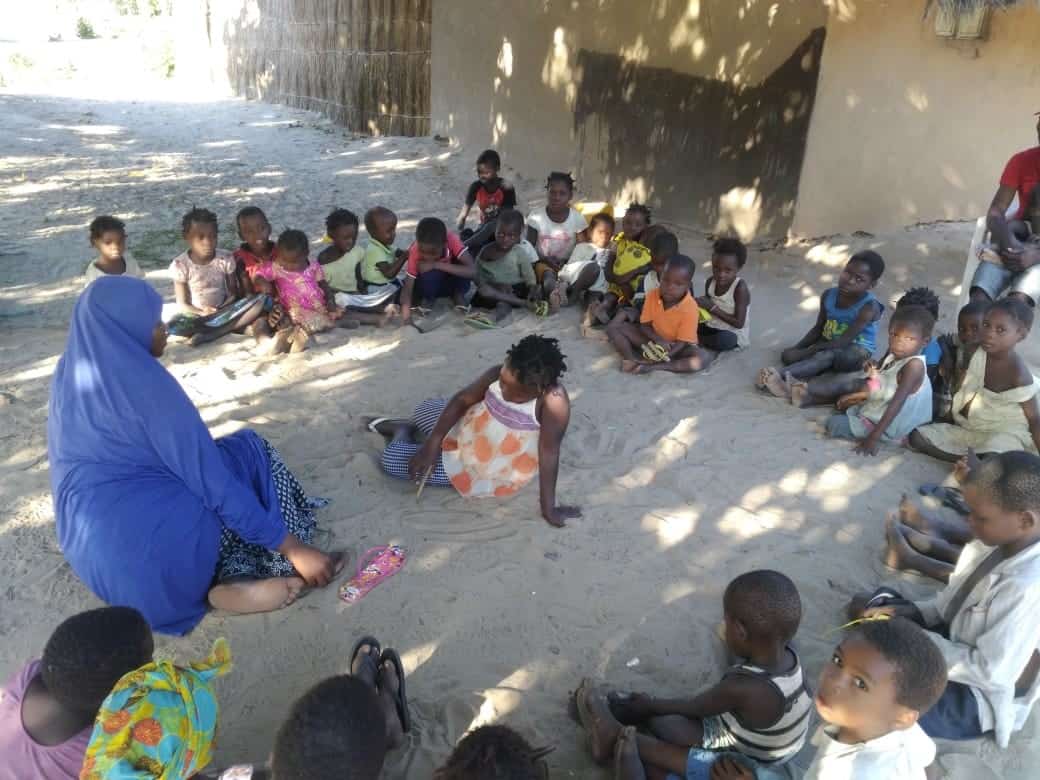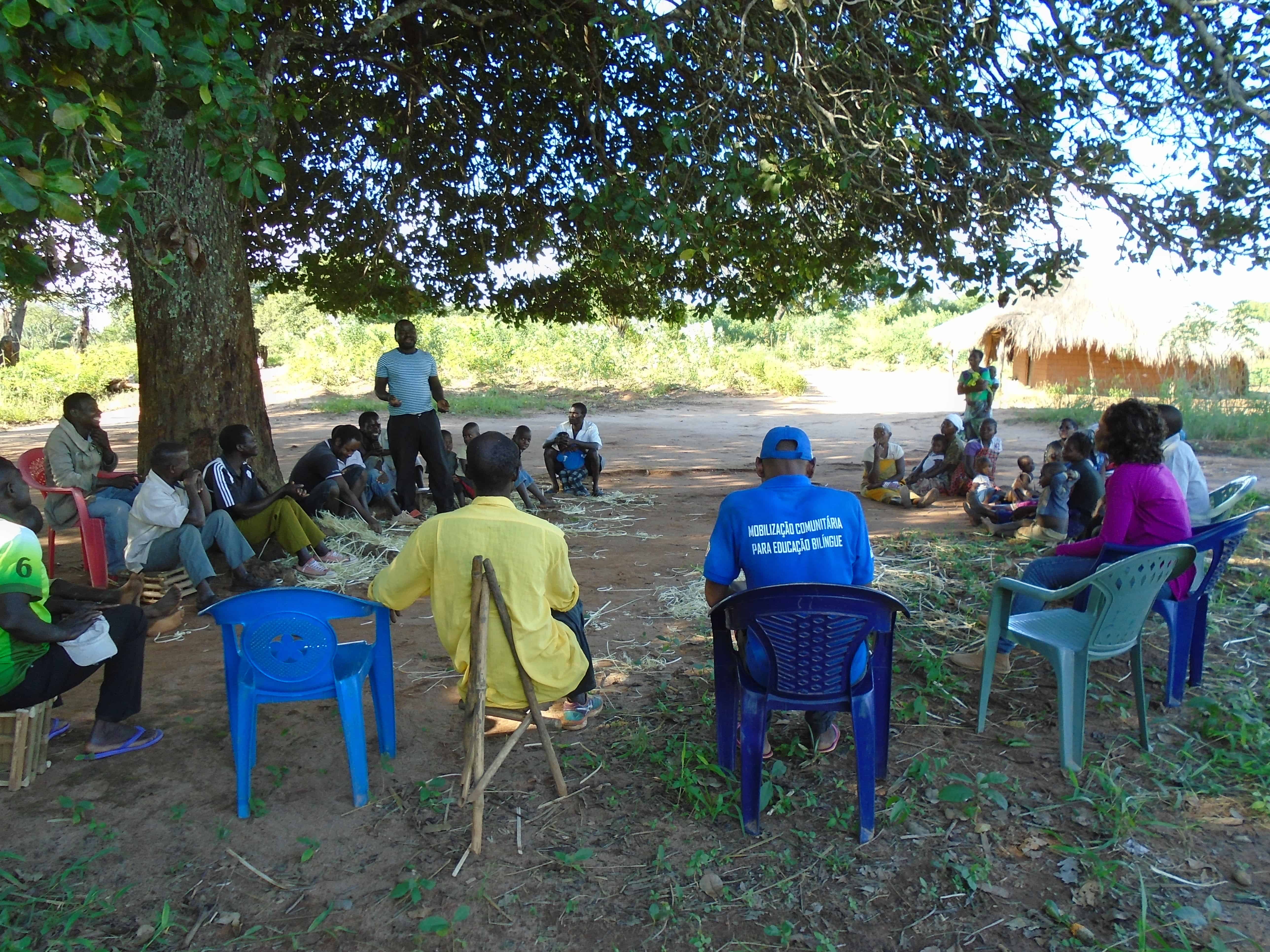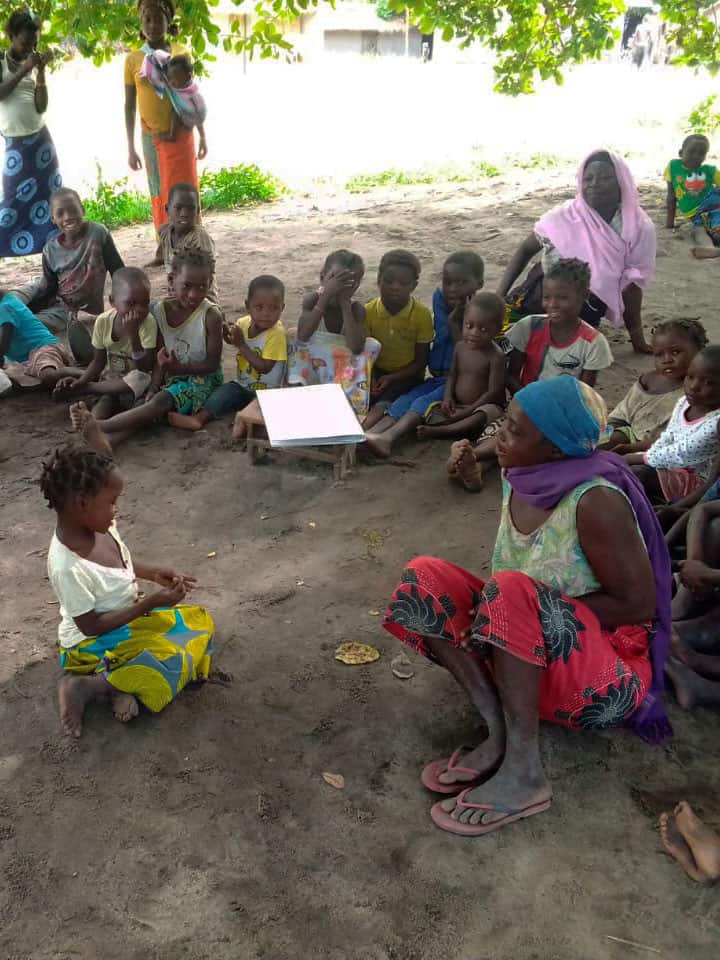Mango and cashew trees planted by community members in rural Mozambique are offering more than just fruit. Sheltered under the trees’ shade, children are learning to read and speak fluently in their local language.
“My son was very ashamed to talk much here at home or with his friends,” said Carlitos Momade, a father in Zambezia, Mozambique. “But when he started participating in Conversemos sessions at the mango trees, I see that his shame is already overcome because when he is asked about something, he is not afraid to answer.”
In this way, one boy’s transformation under a mango tree is indicative of a larger change taking place across two of Mozambique’s poorest provinces, Nampula and Zambezia.
Conversation sessions like the one that helped Momade’s son express himself, as well as radio lessons, reading clubs, theater groups, and parental engagement initiatives led by local organizations, are addressing some of the core issues keeping child literacy rates low.
Funded by the U.S. Agency for International Development, the Vamos Ler! (Let’s Read!) program is supporting this positive momentum by providing grants, technical assistance and capacity building to several local non-governmental organizations. As grantees, these organizations have come alongside Vamos Ler!, joining its mission to increase parental and community engagement in early grade literacy and promote the importance of bilingual education.

The Development Support Association (NANA) and Facilidade: Citizenship and Sustainable Development Institute are two of Vamos Ler!’s grantee organizations mobilizing community engagement in education. Both have a long history in the regions where they work but have struggled to find funding and upgrade their technical capacity.
“We were working with many schools in remote areas that not even the Ministry of Education could reach to supervise,” says Jorge Cardozo, Executive Director of NANA. “Our mobilization campaigns, reading clubs, and support for the school councils were a lifeline for these schools, and not surprisingly many of these schools were the ones with the greatest level of improvement in overall performance among schools where we are working.”
Building community support for bilingual education
Though Mozambique’s official language is Portuguese, it’s a second or third language for 85 percent of the population. Portuguese remains the language of instruction at most Mozambican schools, even though very few rural children start school speaking and understanding the language. This contributes to low reading outcomes for primary school children. Armando Ali, the Program Director for Facilidade, which works in Nampula, says the region also has high rates of teen pregnancy and early marriage, as well as teacher absenteeism.
“So, for us there is no doubt that we must work hard to keep our children in school, improve their learning outcomes, and help to break out of the cycle of poverty that many of them are trapped in,” says Ali.
Vamos Ler! is rooted in evidence showing that kids learn best when they start in their local language. But because parents view Portuguese language fluency as a key to escaping poverty, when the program began many were highly skeptical about bilingual education. That’s why partnering with NANA and Facilidade to lead awareness campaigns was necessary to teach parents the value of bilingual education and to engage communities in building a foundation for better learning outcomes.
Both NANA and Facilidade hosted a series of theater performances and debates about bilingual education. As a result of the theater groups’ performances, parents and community members were more likely to keep their kids in school and help them to learn in their mother tongues. They also learned that bilingual education would contribute to preserving local culture while making the transition to reading in Portuguese easier for kids.
“[I was] convinced that the best thing was to keep my daughters in the same school and that bilingual teaching was the best for them and for the whole family as well as our community,” said Barnabé Joaquim Manuel, a father of four daughters in Namarroi, Zambezia, who attended the plays in his community.
Before measures to stop the spread of COVID-19 were put in place, NANA brought its campaign to 124 communities. The staff recorded the plays as well as the audience’s responses to them to be disseminated in radio programs, amplifying the message in other districts. They also used a variety of methods to reach community leaders, school councils, parents, and teachers about the importance of keeping students in schools through their “Vamos a escola” campaign.

Reading groups and conversation classes
Theater groups and campaigns spread the word on bilingual education for early grade learning, and conversation sessions and reading clubs put the philosophy into practice.
With support from Vamos Ler!, Facilidade trained volunteers and community representatives to lead conversation sessions called “Conversemos,” helping students practice their oral skills and listening comprehension.
Volunteers gathered 30 preschool and school-aged children per session to practice telling stories, as well as parents to engage in “nutritious conversations.” These sessions also had the dual purpose of showing parents gaps in their children’s reading abilities, thus encouraging them take a more active role in their kids’ education.
“Initially, only three to four parents participated [in each session], but this number rose to 15 to 20 parents, especially mothers,” said Juanito Joma, a community volunteer trained by Facilidade.

Nearly 50,000 children and more than 12,000 parents and caregivers benefitted from Conversemos sessions. As a result, these students showed greater participation in class and less absenteeism.
Similarly, NANA launched reading clubs in the Namarroi district of Zambezia. Vamos Ler! trained NANA to identify qualified volunteer reading club facilitators in the communities. The volunteers then worked with schools to set up reading clubs where young children could practice their emerging reading skills and get extra help and support.
“When implementing the reading clubs, the school councils were a vital part of it, helping us to choose the members of the community with the right profile to be reading club volunteer facilitators and giving more support to the clubs,” says Cardoso.
With 1,188 students attending the clubs in different communities, the promoters were able to identify students who had fallen behind in their learning. As a result of the reading clubs, 812 of the students diagnosed with low learning abilities greatly increased their competency in reading and writing, as well as their participation in the classroom.
Before the reading clubs, Anastacia Casimiro said her son Gerson couldn’t read or write, and still had trouble counting in the third grade.
“Gerson was a closed boy… but when he began to participate in the reading club sessions, he was able to let loose and this change in behavior surprised the promoters of the clubs, his teacher and me,” she said.
On the path to self-reliance
The partnerships facilitated through the grants fostered reciprocal relationships among Vamos Ler!, the local NGOs, and the education sector. Vamos Ler! gained access to remote communities and their school systems and the grantee organizations are now more equipped to continue reaching schools and families with sustainable education programs.
For instance, the Conversemos sessions will continue after the grant period ended, now that there is a critical mass of staff and facilitators trained in the approach and who believe in its value.
“It was a good example to show the community engagement with education of their children,” says Ali. “Something as simple as stories and conversations between parents and children helped not only to develop children’s oral capabilities but to have the whole community’s support of this activity.”
Cardoso of NANA says that working with Vamos Ler! is shaping his organization’s future.
“We are now drafting a new strategic plan for 2020-2023, and many of the lessons learned and approaches used during this program will be part of our plan,” says Cardoso.
But at the end of the day, it all comes back to a deep commitment to students’ wellbeing.
“I remember getting very emotional in Mossuril when I saw a second-grade girl reading a long text so fluently in Emakhuwa, it gave me a sense of pride and conviction that this was the right approach,” says Ali.
With reporting from Fernanda Matsinhe and Christine Beasley. All photos were provided by NANA and Facilidade.